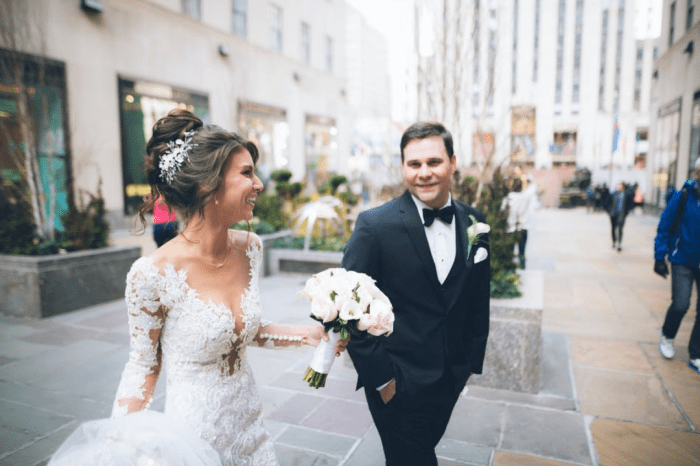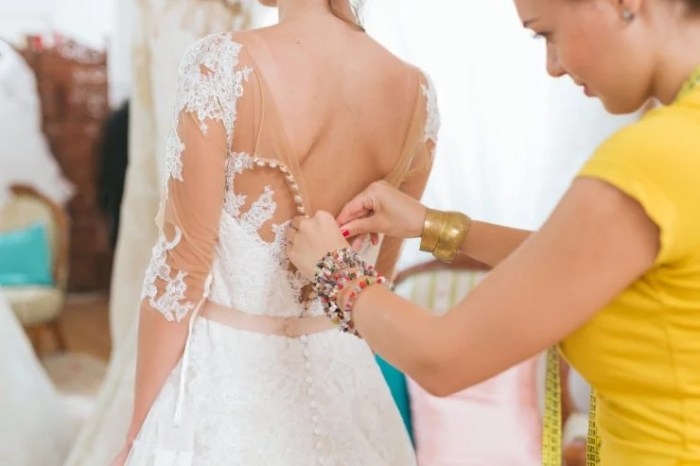Factors Affecting Wedding Dress Alteration Costs

Source: ctfassets.net
Average cost for wedding dress alterations – The cost of altering a wedding dress can vary significantly, influenced by a number of interconnected factors. Understanding these factors empowers you to make informed decisions and manage your budget effectively. Let’s delve into the key elements that determine the final price tag.
Key Factors Determining Alteration Costs
Several crucial factors contribute to the overall cost. The complexity of the alterations required is paramount; a simple hem adjustment differs vastly from a complete bodice restructuring. The fabric type plays a role; delicate lace or intricate beading requires more specialized handling and time, increasing the cost. Designer brands often demand higher alteration fees due to the prestige and potential difficulty of working with unique materials or construction techniques.
Finally, the seamstress’s experience and reputation significantly impact pricing; highly skilled and experienced professionals command higher rates.
Location’s Impact on Pricing

Source: kxcdn.com
Geographic location influences pricing. Seamstresses in urban areas with higher overhead costs often charge more than those in rural settings. Competition, cost of living, and demand all play a part in shaping the pricing structure of alteration services in different locations.
Alteration Costs Across Dress Styles
Different dress styles present unique alteration challenges. A-line dresses generally require less extensive alterations compared to ball gowns or mermaid styles, which often need more complex adjustments to achieve the desired fit. The intricacy of the design and the amount of fabric involved directly affect the time and skill required, thus impacting the cost.
Comparison of Alteration Types and Costs
| Alteration Type | Low-end Cost | Average Cost | High-end Cost |
|---|---|---|---|
| Hemline Adjustment | $50 | $100 | $200 |
| Bust Alterations | $75 | $150 | $300 |
| Waist Alterations | $75 | $150 | $300 |
| Strap Adjustments | $30 | $60 | $100 |
| Train Alterations | $100 | $200 | $400 |
Types of Alterations and Their Costs
Understanding the common alterations and their associated costs is crucial for budget planning. This section provides a detailed breakdown of typical adjustments and their average price ranges.
Typical Wedding Dress Alterations and Costs
- Hemline Adjustments: Shortening or lengthening the hem. Cost range: $50 – $200.
- Bust Alterations: Adjusting the bust size and fit. Cost range: $75 – $300.
- Waist Alterations: Taking in or letting out the waist. Cost range: $75 – $300.
- Strap Adjustments: Altering the straps for better fit and comfort. Cost range: $30 – $100.
- Train Alterations: Adjusting the length or bustle of the train. Cost range: $100 – $400.
- Adding Sleeves or Straps: Adding sleeves or straps to a sleeveless dress. Cost range: $150 – $500+
- Zipper or Closure Repairs: Replacing or repairing a broken zipper or closure. Cost range: $50 – $150.
Simple vs. Complex Alterations
Simple alterations, such as taking in seams, generally cost less than complex alterations, which may involve adding intricate lace, beading, or other embellishments. The level of skill and time required significantly impacts the final price.
Finding Affordable Alteration Services
Finding a reputable and cost-effective seamstress requires research and careful consideration. Several strategies can help you locate skilled professionals who offer fair prices.
Tips for Finding Affordable Alteration Services
- Seek Recommendations: Ask friends, family, or wedding planners for recommendations.
- Online Reviews: Check online reviews and ratings on platforms like Yelp or Google Reviews.
- Visit Multiple Shops: Obtain multiple quotes before making a decision.
- Consider Local Bridal Shops: Many bridal shops have in-house seamstresses or can recommend reputable professionals.
Questions to Ask Potential Seamstresses
- What is your experience with altering wedding dresses?
- Can you provide examples of your previous work?
- What is your pricing structure, and what does it include?
- What is your turnaround time?
- What is your policy on revisions or adjustments?
Negotiating Prices, Average cost for wedding dress alterations
While negotiating prices, maintain professionalism and respect. Clearly explain your budget constraints and explore potential options, such as prioritizing certain alterations over others, or adjusting the timeline to potentially lower the cost. Always ensure you understand the final price and what it encompasses before agreeing.
Budgeting for Alterations
Incorporating alteration costs into your overall wedding budget is essential. Strategic planning and careful consideration can help you manage expenses without compromising quality.
Incorporating Alteration Costs into Your Wedding Budget
Allocate a specific budget for alterations early in the planning process. Consider the type of dress, the necessary alterations, and the average cost ranges discussed earlier. A contingency buffer for unexpected adjustments is advisable.
Saving Money on Alterations
- Choose a simpler dress style: Simpler styles often require fewer alterations.
- Shop for sales and discounts: Find deals on alterations, especially during off-season periods.
- Prioritize essential alterations: Focus on the most important adjustments.
Risks of Choosing the Cheapest Alteration Services
Selecting the absolute cheapest option may result in lower quality workmanship, missed deadlines, or the need for costly rework. Balancing cost with reputation and experience is crucial to avoid potential problems.
Sample Wedding Budget Table
| Budget Item | Estimated Cost | Actual Cost | Notes |
|---|---|---|---|
| Dress Purchase | $1500 | $1450 | Found a sale! |
| Alterations | $300 | $280 | Negotiated a slightly lower price |
| Venue | $5000 | $5000 | On budget |
| Photographer | $2000 | $2000 | On budget |
Illustrative Examples of Alteration Costs: Average Cost For Wedding Dress Alterations
Let’s examine three different scenarios to illustrate the variability in alteration costs.
Scenario 1: Simple A-Line Dress
Dress: A simple A-line gown made of satin. Alterations: Hem adjustment and minor waist alterations. Estimated cost: $150 – $200. The low cost is due to the straightforward design and minimal adjustments needed.
Scenario 2: Intricate Ball Gown
Dress: A heavily beaded ball gown with a long train. Alterations: Extensive bust and waist alterations, train bustle addition, and hem adjustment. Estimated cost: $500 – $800. The high cost reflects the complexity of the alterations and the delicate nature of the fabric.
Scenario 3: Mermaid Gown with Lace
Dress: A mermaid-style gown with intricate lace detailing. Alterations: Hem adjustment, minor waist alteration, and adjustments to the lace bodice. Estimated cost: $300 – $500. The cost is moderate due to a balance between the complexity of the style and the need for precise alterations to the lace.
Query Resolution
What if I need alterations beyond the standard ones?
Expect a higher cost for more complex alterations like significant restructuring or adding substantial embellishments. Always get a detailed quote upfront.
Can I get alterations done after the wedding?
Yes, but it’s generally more cost-effective to do alterations before the wedding. Post-wedding alterations might be more limited in scope.
How much should I tip my seamstress?
A 15-20% tip is standard for excellent service. Consider the complexity of the work and your satisfaction when determining the amount.
What if I’m unhappy with the alterations?
Communicate your concerns with the seamstress immediately. Reputable professionals will work to rectify any issues. Always get everything in writing.